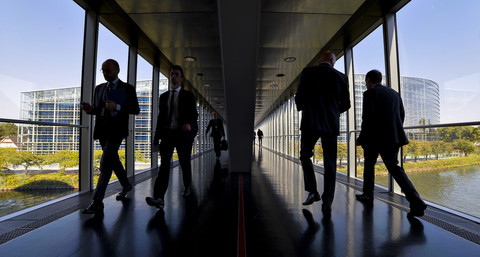[ad_1]

The European Parliament president David Sassoli has invited MEPs to reflect on the institution’s future – opening a broad debate about the best way forward after the Covid-19 pandemic.
“Time to rethink parliamentary democracy and our work,” Sassoli recently wrote on Twitter.
Earlier this year, the EU Parliament chief developed a strategy to create “a more resilient and effective institution”, better prepared to deal with future crisis.
According to an official from the institution, this “reflection exercise” is based on lessons learnt from the past months in which the EU Parliament adopted extraordinary measures and developed new ways of working to ensure continuity in its work.
Following a preliminary consultation with some MEPs, five focus groups have been created to gather ideas and to provide specific recommendations before the summer. These groups are composed of a representative group of cross-party MEPs.
The working groups are focusing on several topics, including reforming the plenary sessions and making debates more dynamic.
Some of the proposals currently being discussed include increasing time for individual speakers on important debates, being able to intervine more regularly, and having more opportunities to hold the European Commission to account in plenary. On key and controversial legislative issues, MEPs also say voting should start right after the debates.
“The disruption of the pandemic has forced us to reflect about our parliamentary practices, but many deliberations predate Covid-19,” said MEP Sven Simon of the centre-right European People’s Party, a member of the group working on the reform of plenary sessions.
“A lot of colleagues would like to see more lively debates in the EU parliament… [which] can play a greater role in the creation of a true pan-European public sphere if it becomes a better debating venue,” he added.
MEPs are also invited to come up with ideas on how to strengthen the parliament’s scrutiny powers and oversight of the European Commission. While such scrutiny takes many forms, EU lawmakers underlined that a reform of committee meetings is needed.
Reflecting on foreign diplomacy and human rights, communicating effectively with citizens, plus possible internal re-organisation will also be discussed by other focus groups.
In addition to the focus groups, there is a digital platform open to all MEPs to contribute and monitor progress.
‘Not just a talking show’
After the summer break, the recommendations from the focus groups will be submitted to the governing bodies in charge of the administrative, financial, and organisational matters of the hemicycle. They should conclude what proposals can be implemented by the end of November.
However, some MEPs have advocated for pilot projects before or right after the summer.
“The change of working methods brought by the pandemic last year hit everyone, and, therefore, there is a certain openness to change things,” said Green MEP Damian Boeselager.
“But there is a window of opportunity already, in September, to avoid going back to the old model,” he added.
For example, the use of the plenary podium by parliamentarians, a sanitary measure put in place because of the pandemic, should remain in place in September, he said.
Meanwhile, socialist MEP Lara Wolters said that these proposals aim to address “the disconnect with citizens and rise of populism” in Europe, aiming to turn the Brussels and Strasbourg parliament into “a real forum for democracy”.
“Covid-19 has shown that change is possible, and the president [Sassoli] wants to make sure that we do not miss the opportunity for change that has presented,” she said, arguing that there is a big cross-party group of MEPs keeping pressure to make sure that this reflection exercise is not just “a talking show”.
[ad_2]
Source link